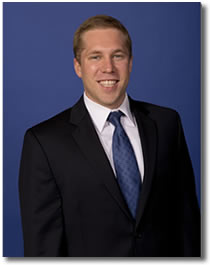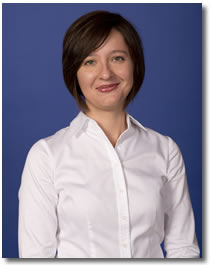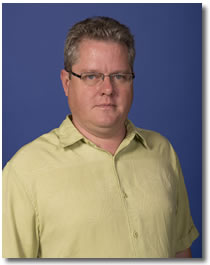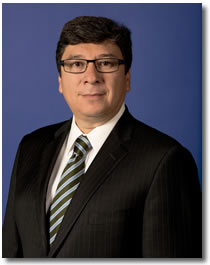New Faculty Web Extra
Bryan Gervais | Dina Krasikova | John Sutterby | Rene Zenteno
Bryan Gervais
Assistant Professor of Political Science

It seems that nowadays politicians seldom find, or even search for, common ground. As the political debate becomes increasingly rancorous, Bryan Gervais, a UTSA assistant professor of political science, is focusing on the factors that are giving rise to the growing “incivility” in the public’s political discussion of the issues.
Gervais is teaching The Legislative Process, which explores the basic workings and theoretical underpinnings of Congress. It delves into whether there is something wrong with the institution that needs fixing. He also teaches an Introduction to American Government class and will offer Political Psychology in the spring.
The timing is good, he said, as rhetoric from both Democratic and Republican parties ramps up in anticipation of the 2014 midterm election.
But that also means that people have become more accustomed to cable news’ “take-no-quarter” approach and to chat rooms that mirror their point of view.
“With the rise of cable news and the growth in social media over the last two decades, there is more of an opportunity for people to seek out the different types of media that reflect their pre-existing views,” said Gervais.
And the rise in the use of the Internet allows people the ability to talk back, whether on Facebook on a message board, he added.
“That is giving rise to political behavior that is increasingly ‘uncivil,’” he said.
Gervais, who earned his Ph.D. in government and politics from the University of Maryland, researches American political behavior, political communication, political psychology, and American legislative behavior.
He notes that the public’s voting behavior and increasing partisanship is a reflection of the fact that “more and more people are expressing their own views to their own audience [of like-thinkers].”
The rise of the so-called “rude democracy” and the highly charged nature of much of today’s political debate are also furthering the decline in civility in American politics, he said.
Further, the more the belief that a race is won via illegal or illegitimate means, the greater the polarized views become between the winning and the losing sides. That has political consequences because it demonstrates that the electorate’s confidence in the process has diminished.
Dina Krasikova
Assistant Professor of Management

If your boss reminds you of Darth Vader, then you might be familiar with destructive leadership. Destructive leadership is like crossing over into the dark side. Leaders can be bad by either being ineffective in their jobs, or by being intentionally harmful to their subordinates and organizations.
Destructive leadership is one of the many areas of study of Dina Krasikova, assistant professor of management. Professionally, Krasikova studies negative work relationships, but personally the collegial environment in the Department of Management was one of the reasons that she joined UTSA this year following a two-year post-doctoral fellowship at the University of Nebraska.
“I chose UTSA because it was a place where high-quality research is valued, and I felt an instant connection with my colleagues. I wanted to work in an environment that fostered both personal and professional relationships,” said Krasikova, a native of Russia.
As an undergraduate, Krasikova became interested in how people behave in organizations. This curiosity led her to study leadership processes in the workplace. Recently, she and her co-authors published a paper in the Journal of Management on destructive leadership. Her research found that leader personality characteristics, subordinate behaviors and organizational context can influence the occurrence of destructive leadership.
Krasikova has also merged her passion for studying leadership with developing analytical tools that can be used to study relationships between leaders and followers in the workplace.
“A dyad is two individuals that maintain a relationship such as a boss and a subordinate or a pair of co-workers,” said Krasikova. “It is beneficial to study those relationships from the perspective of both members of a dyad.”
She and her former adviser, an expert in statistical methodology, have published a paper in the Journal of Applied Psychology that is essentially a tutorial for others to use to learn how to analyze and collect data from dyads.
“My goal is to make an impact on the field of organizational behavior by conducting research that clarifies leadership processes in organizations and by developing methods that can help researchers better study organizational phenomena,” said Krasikova.
And, ultimately, she hopes that her work can contribute to UTSA’s mission of becoming a Tier One Research University.
John Sutterby
Associate Professor of Interdisciplinary Learning and Teaching

Play is in John Sutterby’s DNA. Actually, it’s in all of ours, he says.
The associate professor of interdisciplinary learning and teaching has made the study of play his vocation.
“I think play is critical,” he said. “We couldn't live without it.”
And everyone does it, from infants to seniors. It’s easy to think about childhood play with dolls and miniature cars, but for adults, playtime may not be as obvious.
Take gardening, he said. The pursuit of the right colors of flowers or the perfect vegetables or fruits to grow can be playful and social, he explained, making it a more nontraditional form of play.
Then there is more obvious play, such as the Red Hat Society, a group of women who have formed an international social network that bucks convention and seeks fun, friendship and fitness, among other things.
“Play covers a wide range of behaviors,” Sutterby said. “Generally, it’s something that you’re stepping outside of yourself in some way. Think about people putting on a play, ‘playing’ a character or a role. Generally it’s not behavior related to survival, like eating, and it should have some sort of element of fun to it. You have to be engaged in it.”
Sutterby’s first professional interaction with play came after receiving his B.S. in early childhood education from UT Austin. He was a prekindergarten teacher, and quickly learned that to engage a group of 4-year-olds, he had to make it interesting and playful.
Then in graduate school, he studied under one professor who was an expert in playgrounds and another who studied play culture and language. He was hooked.
“I became the weird play guy,” he said of his time researching playgrounds while his children were growing up. “I did so much research that I would be the one climbing up on the equipment to inspect it.”
In 2002, he received his Ph.D. in multilingual studies after completing a dissertation on play interactions between children from different cultures and languages. Since then, he has worked at the University of Texas at Brownsville and the University of Houston.
At UTSA, he’ll bring all his experiences—from his own childhood playtime of building forts and secret hideouts in the woods to the teaching practices he picked up from pre-k—into the classroom.
“I use examples of things I did as a teacher. That has had a big impact on how I teach,” he said. “When you think about working with young children, 3- and 4-year-olds, their attention is not very long so you have to figure out ways to get them to learn the materials but in a playful and fun way. I think that shapes my teaching because I think the same thing applies to adults. They are not going to sit there and pay attention to you if you don’t make it interesting for them.”
Because, after all, we’re all looking for a little play, he added.
Rene Zeteno
Professor of Demography

Few universities in the country are as ideally positioned as UTSA to explore and promote the complex relationship that exists between the United States and Mexico, said Rene Zenteno.
The renowned demographer and former undersecretary of population, migration and religious affairs in the Ministry of the Interior in Mexico was directly responsible for Mexico’s population, migration and refugee policy. He also was key in the writing and enacting of the 2011 Immigration Law that provides basic rights to migrants in Mexico regardless of immigration status.
This spring he will be teaching a course on public policy analysis.
“My challenge will be to help establish UTSA as a world-class research institution with the general interest of following and studying U.S.-Mexico relations and how to set the relevant bi-national public policy discussion so that the College of Public Policy leads the field,” he said. “There is a genuine interest about what is happening in the economy and society of the U.S.-Mexico border in addition to the migration policy issues.”
Zenteno comes to UTSA from the prestigious Tijuana-based El Colegio de la Frontera Norte, where he served as provost. He is also the former executive director of the Center for U.S.-Mexican Studies at the University of California, San Diego.
Zenteno, who secured his doctoral degree from the University of Texas at Austin, has published extensively on U.S.-Mexico migration as well as social and demographic change, international migration and social inequality with a focus on Mexico.
He said massive changes currently contemplated by the U.S. Congress—doubling the size of the Immigration and Customs Enforcement’s Border Patrol and expending massive sums to add to the border fence—“are going to have an impact on bi-national relations, and the border won’t be the friendly territory everybody was imagining 20 years ago when NAFTA was enacted.”
The challenge with immigration reform, he said, is to create a path for citizenship for the estimated 11 million undocumented immigrants in the U.S. by paying close attention to substance rather than rhetoric.
“We must learn a lesson from the past. Migrants will keep illegally crossing the border if they can be hired by American businesses that want them,” he said. “Effective employment verification is the crucial policy instrument to end the historical appetite of the U.S. labor market for undocumented immigrant workers.”
